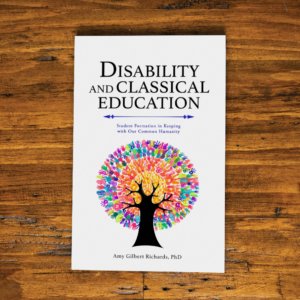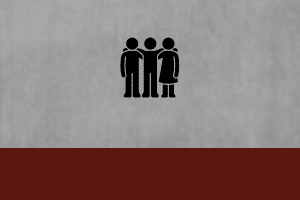In this course, Dr. Amy Gilbert Richards introduces both a philosophical basis and practical guidance for serving students with special learning needs within classical schools. A classical education should orient us towards how the true, the good, and the beautiful manifest themselves in human lives. Which leads, of course, to the even more fundamental question: what is it to be human? In responding to this question, we gain an understanding of what constitutes a good human life and what determines the nature of human virtue and the telos of education. At the heart of any adequate response to the question of what it is to be human, Dr. Richards argues, lies a careful consideration of persons with disabilities, as they reveal to us in particularly profound ways the relational nature of our humanity is often denied or overlooked by our focus on autonomy and self-sufficiency. Consideration of persons with disabilities shows us that our vulnerability and our connections with one another are not obstacles to achieving our human telos but a necessary condition of it. We need not only to allow persons with disabilities to serve as a light by which we can understand what it is to be human, but also to make our classrooms hospitable to such persons. Dr. Richards makes the case that serving students with special learning needs is central to leading classical Christian education forward into the fullness of the truth and justice towards which it strives. She goes on to outline some initial techniques and considerations—both those already part of the classical pedagogical repertoire and those developed in the broader world of special education that are consonant with a classical approach—that can help schools, teachers, and parents to guide students with special needs towards the true, the good, and the beautiful.
Dr. Amy Gilbert Richards is Affiliate Professor and Chair of Philosophy at Eastern University. She also teaches in Eastern’s Templeton Honors College (THC), dedicated to great books and great questions. She is also a Faculty Fellow of the THC’s Master of Arts in Classical Teaching program. Building on her previous work in philosophical and theological anthropology, she teaches a course in this program called “Difference and Human Dignity in the Great Tradition” that is dedicated both to developing an understanding of what it is to be human through the lens of disability and difference, and to offering practical techniques for classical classroom approaches for students with special needs. She lives in Havertown, PA with her husband and their three small girls.
You may also enjoy Dr. Richards’s book in presenting the information in this course. Disability and Classical Education: Student Formation in Keeping with Our Common Humanity is available to preorder in paperback now with a Kindle book available soon. This book follows the content of the video course closely, but with additional material. Both the book and course stand on their own.
Praise for Disability and Classical Education
“It should go without saying that anyone who operates a classical school must read Dr. Richards’s book, but I would argue that everyone engaged in educating children with disabilities would benefit from the expanded horizon that her ideas offer. In a way that is philosophical yet grounded, elevated yet accessible, we are shown that our commitment to educating any student is dependent on how we welcome students to our classrooms.” —Thomas Doebler, Senior National Director of Exceptional Student Services, Great Hearts Academies
“After two decades as a special education teacher, encountering Dr. Amy Richards’ writing on the nature of disability finally illuminated for me why I could not overcome the chronic obstacles that derailed my special education programs time and again. Her introduction of the concepts of telic attention and doxological classrooms will be life changing for the educator seeking to understand where we should begin in our approach to disabilities and education. It will spark rich conversations among colleagues seeking a beautiful path through this strange vocation we know and love.” —Sarah Kwilinski, MAT, Director of Sundial Classical Farmstead

To learn more about earning a certificate for this course, please visit “How do I Obtain a Course Certificate?” on our FAQ page. Our course certificates are valued by classical schools and co-ops worldwide. Teachers certified with either ACSI or ACCS will see continuing education unit (CEU) credits listed on our course certificate for you to submit to either organization (with more information on certification credit here).




